新视野大学英语教案第1册
- 格式:doc
- 大小:363.00 KB
- 文档页数:46
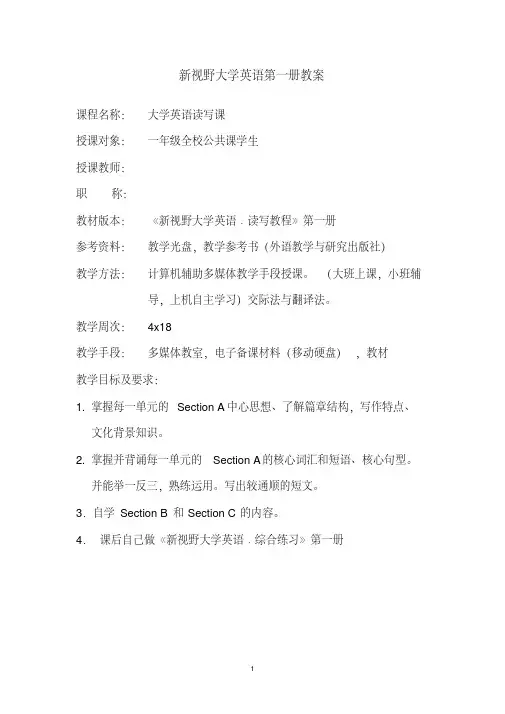
新视野大学英语第一册教案课程名称:大学英语读写课授课对象:一年级全校公共课学生授课教师:职称:教材版本:《新视野大学英语﹒读写教程》第一册参考资料:教学光盘,教学参考书(外语教学与研究出版社)教学方法:计算机辅助多媒体教学手段授课。
(大班上课,小班辅导,上机自主学习)交际法与翻译法。
教学周次:4x18教学手段:多媒体教室,电子备课材料(移动硬盘),教材教学目标及要求:1.掌握每一单元的Section A中心思想、了解篇章结构,写作特点、文化背景知识。
2.掌握并背诵每一单元的Section A的核心词汇和短语、核心句型。
并能举一反三,熟练运用。
写出较通顺的短文。
3.自学Section B 和Section C 的内容。
4.课后自己做《新视野大学英语﹒综合练习》第一册新视野大学英语教案Unit One一、教学内容:(Content of the Course)Section A Learning a foreign LanguageSection B Keys to Successful Online LearningSection C Teaching Children at Home二、教学对象:(Audience)三、教学时间:(Teaching Span)6----7学时四、教学目的:(Teaching Aims)1.Appreciate the text to know the author’s experience of learning a foreign language2. Learn to use some important words, expressions and sentence patterns3. Practice listening, speaking, reading and writing4. Learn some translation skills五、教学任务及步骤:(Instructing Objective &.Teaching Procedures)Step One (Pre-reading Activities)(导入)文章主题(Themes)10 minutes课文A 作者介绍了自己在外语学习中的亲身经历。
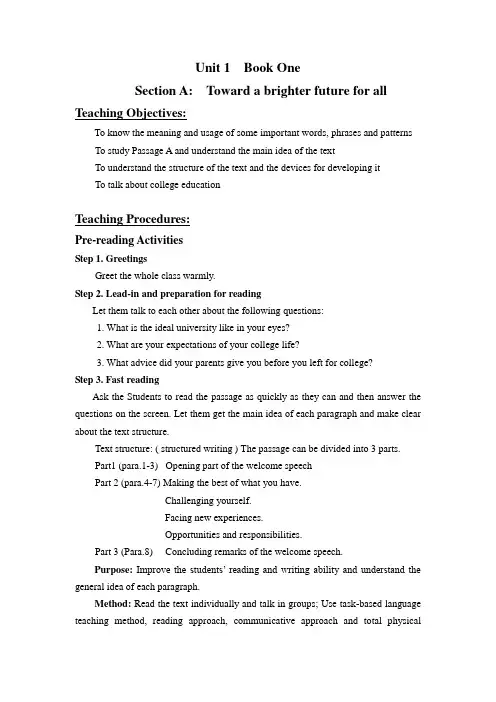
Unit 1 Book OneSection A: Toward a brighter future for all Teaching Objectives:To know the meaning and usage of some important words, phrases and patterns To study Passage A and understand the main idea of the textTo understand the structure of the text and the devices for developing itTo talk about college educationTeaching Procedures:Pre-reading ActivitiesStep 1. GreetingsGreet the whole class warmly.Step 2. Lead-in and preparation for readingLet them talk to each other about the following questions:1. What is the ideal university like in your eyes?2. What are your expectations of your college life?3. What advice did your parents give you before you left for college?Step 3. Fast readingAsk the Students to read the passage as quickly as they can and then answer the questions on the screen. Let them get the main idea of each paragraph and make clear about the text structure.Text structure: ( structured writing ) The passage can be divided into 3 parts.Part1 (para.1-3) Opening part of the welcome speechPart 2 (para.4-7) Making the best of what you have.Challenging yourself.Facing new experiences.Opportunities and responsibilities.Part 3 (Para.8) Concluding remarks of the welcome speech.Purpose: Improve the students’ reading and writing ability and understand the general idea of each paragraph.Method: Read the text individually and talk in groups; Use task-based language teaching method, reading approach, communicative approach and total physicalresponse method.Step 4. Preparation for details of the text on the screenStudents are required to look at the Words and Phrases on the screen and give a brief presentation in class.Words and Phrases:Purpose: Train the Students’ ability of unde rstanding and using foreign language.Method:Talk in groups, Use task-based language teaching method, communicative approach and total physical response method.1. (Para.1)pledge to do sth. 作保证,承诺China and the United states pledge to boost cooperation and exchange to ensure a better future for China-US ties.中美政府承诺将加强合作与交流以确保两国关系的未来更加美好。
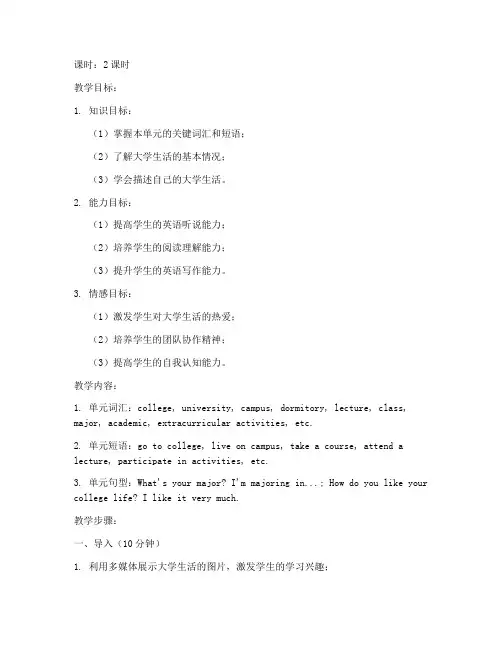
课时:2课时教学目标:1. 知识目标:(1)掌握本单元的关键词汇和短语;(2)了解大学生活的基本情况;(3)学会描述自己的大学生活。
2. 能力目标:(1)提高学生的英语听说能力;(2)培养学生的阅读理解能力;(3)提升学生的英语写作能力。
3. 情感目标:(1)激发学生对大学生活的热爱;(2)培养学生的团队协作精神;(3)提高学生的自我认知能力。
教学内容:1. 单元词汇:college, university, campus, dormitory, lecture, class, major, academic, extracurricular activities, etc.2. 单元短语:go to college, live on campus, take a course, attend a lecture, participate in activities, etc.3. 单元句型:What's your major? I'm majoring in...; How do you like your college life? I like it very much.教学步骤:一、导入(10分钟)1. 利用多媒体展示大学生活的图片,激发学生的学习兴趣;2. 提问:What do you think of college life? 引导学生思考大学生活的特点。
二、新课导入(20分钟)1. 介绍本单元的主题:Introduction to College Life;2. 预习课文,让学生了解课文内容;3. 分析课文结构,划分段落大意;4. 重点讲解生词、短语和句型。
三、词汇学习(20分钟)1. 列出本单元的生词和短语,让学生朗读并解释;2. 设计单词卡片,让学生通过游戏形式复习生词;3. 引导学生运用所学词汇进行造句。
四、听力练习(20分钟)1. 播放听力材料,让学生听后回答问题;2. 分析听力材料,讲解听力技巧;3. 让学生复述听力材料的主要内容。
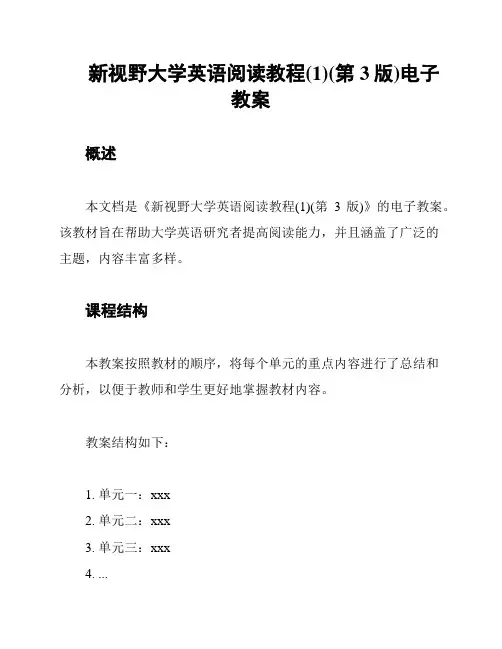
新视野大学英语阅读教程(1)(第3版)电子
教案
概述
本文档是《新视野大学英语阅读教程(1)(第3版)》的电子教案。
该教材旨在帮助大学英语研究者提高阅读能力,并且涵盖了广泛的
主题,内容丰富多样。
课程结构
本教案按照教材的顺序,将每个单元的重点内容进行了总结和
分析,以便于教师和学生更好地掌握教材内容。
教案结构如下:
1. 单元一:xxx
2. 单元二:xxx
3. 单元三:xxx
4. ...
教案特点
1. 简洁明了:教案主要围绕教材的核心内容,精心设计,以帮助学生高效研究。
2. 重点突出:教案对每个单元的重点内容进行了深入分析和解读,帮助学生理解主题和细节。
3. 练提供:教案中提供了相关的练题目,帮助学生巩固所学知识。
使用方法
教师可以根据教案的内容,结合教材中的教学资源,有针对性地进行教学。
学生可以参考教案中的分析和练,加深对教材内容的理解和掌握。
注意事项
1. 教案只是一种辅助工具,教师需要根据实际情况进行灵活运用。
2. 教案中提供的练题目可以作为学生自我评估和巩固复的资料,但并不是教学的全部内容。
以上是《新视野大学英语阅读教程(1)(第3版)电子教案》的简
要信息,请教师和学生根据实际需要进行使用。
如有任何疑问或需
进一步了解,请参阅教材原文。
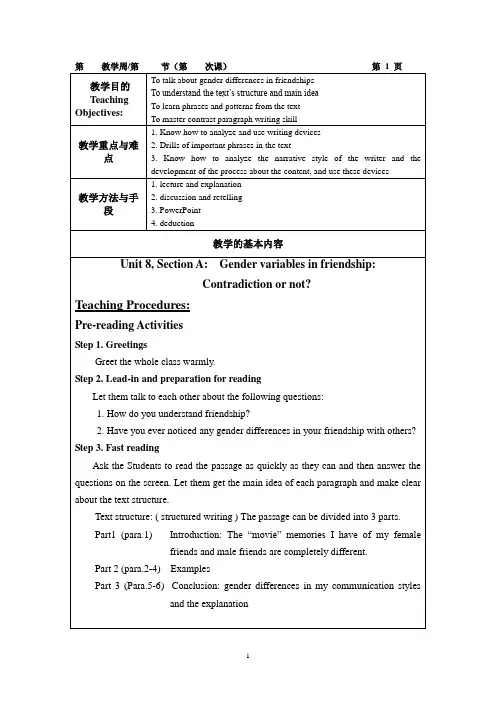
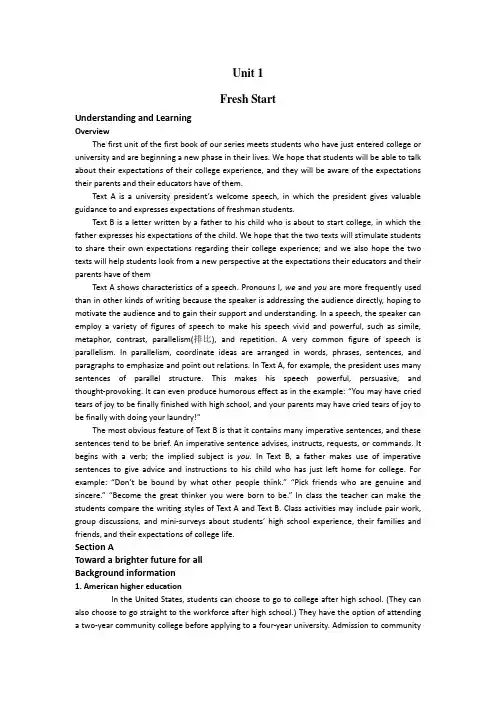
Unit 1Fresh StartUnderstanding and LearningOverviewThe first unit of the first book of our series meets students who have just entered college or university and are beginning a new phase in their lives. We hope that students will be able to talk about their expectations of their college experience, and they will be aware of the expectations their parents and their educators have of them.Text A is a university president’s welcome speech, in which the president gives valuable guidance to and expresses expectations of freshman students.Text B is a letter written by a father to his child who is about to start college, in which the father expresses his expectations of the child. We hope that the two texts will stimulate students to share their own expectations regarding their college experience; and we also hope the two texts will help students look from a new perspective at the expectations their educators and their parents have of themText A shows characteristics of a speech. Pronouns I, we and you are more frequently used than in other kinds of writing because the speaker is addressing the audience directly, hoping to motivate the audience and to gain their support and understanding. In a speech, the speaker can employ a variety of figures of speech to make his speech vivid and powerful, such as simile, metaphor, contrast, parallelism(排比), and repetition. A very common figure of speech is parallelism. In parallelism, coordinate ideas are arranged in words, phrases, sentences, and paragraphs to emphasize and point out relations. In Text A, for example, the president uses many sentences of parallel structure. This makes his speech powerful, persuasive, and thought-provoking. It can even produce humorous effect as in the example: “You may have cried tears of joy to be finally finished with high school, and your parents may have cried tears of joy to be finally with doing your laundry!”The most obvious feature of Text B is that it contains many imperative sentences, and these sentences tend to be brief. An imperative sentence advises, instructs, requests, or commands. It begins with a verb; the implied subject is you.In Text B, a father makes use of imperative sentences to give advice and instructions to his child who has just left home for college. For example: “Don’t be bound by what other people think.”“Pick friends who are genuine and sincere.”“Become the great thinker you were born to be.”In class the teacher can make the students compare the writing styles of Text A and Text B. Class activities may include pair work, group discussions, and mini-surveys about students’high school experience, their families and friends, and their expectations of college life.Section AToward a brighter future for allBackground information1. American higher educationIn the United States, students can choose to go to college after high school. (They can also choose to go straight to the workforce after high school.) They have the option of attending a two-year community college before applying to a four-year university. Admission to communitycollege is easier, tuition is lower, and class sizes are often smaller than at a university. Community college students can earn an associate agree and transfer up to two years of course credits to a university.College and university students need to pay tuition, but many earn scholarships or receive loans. Although admissions policies vary from one university to another, most determine admission based on several criteria, including a student’s high school course of study, high school Grade Point Average (GPA), participation in extracurricular activities, SAT(Scholastic Assessment Test) or ACT (American College Testing) exam scores, a written essay, and possibly a personal interview with a representative from the admissions office.Most students in the United States take the SAT Reasoning Test or the ACT during their final year of high school. Each university sets a minimum SAT or ACT score that a student must achieve in order to gain admission. These are standardized quantitative examinations. The SAT tests critical reading, mathematics, and writing skills, The ACT tests English, mathematics, reading, science reasoning, and includes an optional writing test.Extracurricular activities may include scholastic clubs, athletic teams, student government, and philanthropic clubs. Voluntary participation in these kinds of activities is an indication that a student has learned valuable life lessons, such as teamwork, leadership, or civic responsibility.University students pursuing a bachelor’s degree are called “undergraduates”; students pursuing a master’s or doctoral degree are called “graduate students”. Most universities give under graduate students a liberal education, which means students are required to take courses across several disciplines before they specialize in a major field of study. Graduate and professional programs, such as medicine or law, are specialized. All degree programs require students to complete a minimum number of credit hours before graduating.Selection for admission to a graduate program is based on several criteria. These include completion of a bachelor’s degree, the student’s undergraduate coursework and GPA. Students are also expected to write an essay as part of their application or to submit a writing sample. Most master’s programs require students to have a minimum score on the Graduate Record Examination (GRE), which tests verbal reasoning, quantitative reasoning, critical thinking, and analytical writing skills.Students continue to take course at the graduate level. A final thesis is required for most master’s programs. Doctoral students take course until they have earned enough credit hours to attempt their qualifying examinations. These are usually taken over several days and often include a written and oral component. After doctoral students pass their qualifying exams, they are advanced to candidacy and can begin writing their dissertation. Before the degree is given, the completed dissertation must be orally defended before the candidate’s faculty committee. 2. Vera WangVera Wang is a Chinese-American fashion designer. She was born and raised in New York City. While trained as a figure skater in high school, she eventually earned a degree in art history from Sarah Lawrence College in 1971. But a career in fashion was her dream. She worked as a senior fashion editor for Vogue magazine for 15 years. In 1985, she left vogue and joined Ralph Lauren as a design director for two years. In 1990, she opened her own design salon in New York, and featured her trademark bridal gowns. Wang has made wedding gowns for many celebrities and public figures, such as Jennifer Lopez (詹尼佛·洛佩兹), Sharon Stone (莎朗·斯通) and Chelsea Clinton (切尔西·克林顿).Detailed study of the text1. Your achievement is the triumph of years of hard work, both of your own and of your parents and teachers. (Para. 1)Meaning: Your entering this university is an important success. This success is due to many years of your hard work, and many years of your parents’ and teachers’ hard work.★triumph: n. [C] an important victory or success after a difficult struggle (尤指苦战后获得的)胜利,成功,成就Winning the championship was a great personal triumph for this young tennis player.赢得冠军对这个年轻的网球运动员来说是很大的个人成就。
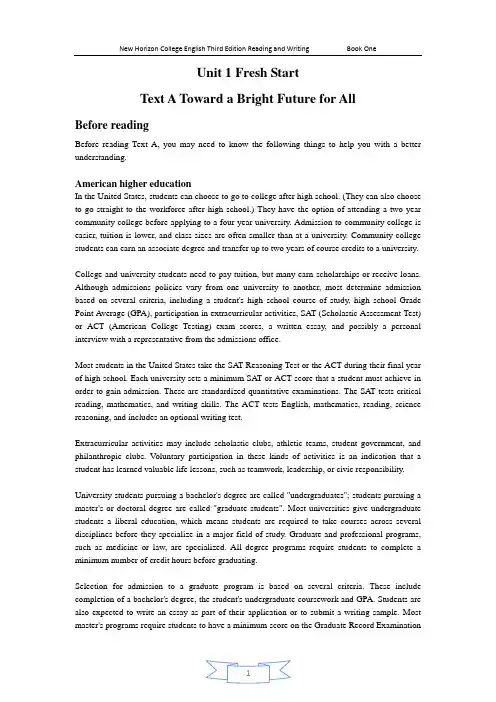
Unit 1 Fresh StartText A Toward a Bright Future for AllBefore readingBefore reading Text A, you may need to know the following things to help you with a better understanding.American higher educationIn the United States, students can choose to go to college after high school. (They can also choose to go straight to the workforce after high school.) They have the option of attending a two-year community college before applying to a four-year university. Admission to community college is easier, tuition is lower, and class sizes are often smaller than at a university. Community college students can earn an associate degree and transfer up to two years of course credits to a university.College and university students need to pay tuition, but many earn scholarships or receive loans. Although admissions policies vary from one university to another, most determine admission based on several criteria, including a student's high school course of study, high school Grade Point Average (GPA), participation in extracurricular activities, SAT (Scholastic Assessment Test) or ACT (American College Testing) exam scores, a written essay, and possibly a personal interview with a representative from the admissions office.Most students in the United States take the SAT Reasoning Test or the ACT during their final year of high school. Each university sets a minimum SAT or ACT score that a student must achieve in order to gain admission. These are standardized quantitative examinations. The SAT tests critical reading, mathematics, and writing skills. The ACT tests English, mathematics, reading, science reasoning, and includes an optional writing test.Extracurricular activities may include scholastic clubs, athletic teams, student government, and philanthropic clubs. V oluntary participation in these kinds of activities is an indication that a student has learned valuable life lessons, such as teamwork, leadership, or civic responsibility.University students pursuing a bachelor's degree are called "undergraduates"; students pursuing a master's or doctoral degree are called "graduate students". Most universities give undergraduate students a liberal education, which means students are required to take courses across several disciplines before they specialize in a major field of study. Graduate and professional programs, such as medicine or law, are specialized. All degree programs require students to complete a minimum number of credit hours before graduating.Selection for admission to a graduate program is based on several criteria. These include completion of a bachelor's degree, the student's undergraduate coursework and GPA. Students are also expected to write an essay as part of their application or to submit a writing sample. Most master's programs require students to have a minimum score on the Graduate Record Examination(GRE), which tests verbal reasoning, quantitative reasoning, critical thinking, and analytical writing skills.Students continue to take courses at the graduate level. A final thesis is required for most master's programs. Doctoral students take courses until they have earned enough credit hours to attempt their qualifying examinations. These are usually taken over several days and often include a written and oral component. After doctoral students pass their qualifying exams, they are advanced to candidacy and can begin writing their dissertation. Before the degree is given, the completed dissertation must be orally defended before the candidate's faculty committee.Vera WangVera Wang (王薇薇, 1949- ) is aChinese-American fashion designer. Shewas born and raised in New York City.While trained as a figure skater in highschool, she eventually earned a degree in arthistory from Sarah Lawrence College in1971. But a career in fashion was her dream.She worked as a senior fashion editorfor Vogue magazine for 15 years. In 1985,she left Vogue and joined Ralph Lauren as adesign director for two years. In 1990, she opened her own design salon in New York, and featured her trademark bridal gowns. Wang has made wedding gowns for many celebrities and public figures, such as Jennifer Lopez (珍妮弗•洛佩兹), Sharon Stone (莎朗•斯通) and Chelsea Clinton (切尔西•克林顿).Detailed study of the textPara.1. Good afternoon! As president of the university, I am proud to welcome you to this university. Your achievement is the triumph of years of hard work, both of your own and of your parents and teachers. Here at the university, we pledge to make your educational experience as rewarding as possible.下午好!作为校长,我非常自豪地欢迎你们来到这所大学。
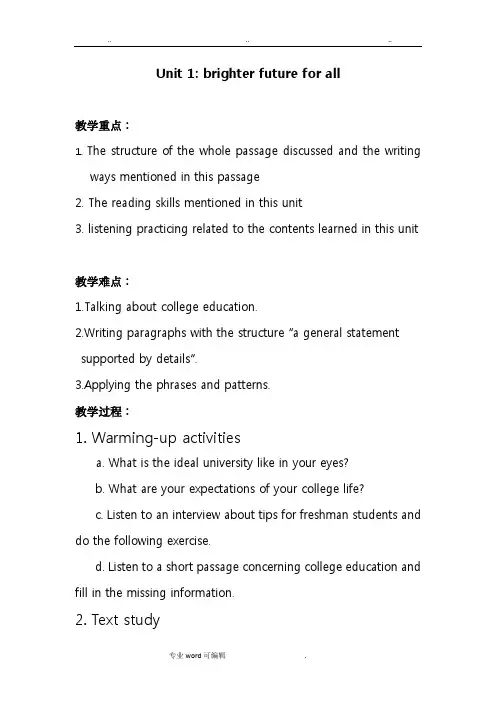
Unit 1: brighter future for all教学重点:1. The structure of the whole passage discussed and the writing ways mentioned in this passage2. The reading skills mentioned in this unit3. listening practicing related to the contents learned in this unit教学难点:1.Talking about college education.2.Writing paragraphs with the structure “a general statement supported by details”.3.Applying the phrases and patterns.教学过程:1. Warming-up activitiesa. What is the ideal university like in your eyes?b. What are your expectations of your college life?c. Listen to an interview about tips for freshman students and do the following exercise.d. Listen to a short passage concerning college education and fill in the missing information.2. Text studya. Main idea of the partsIn his welcome speech, the president urges students to take advantage of the unique opportunity to face new exciting experience and to challenge themselves so that they will reap the benefits of their college years. The president also expresses the university’s expectations of its students and of the responsibilities they carry.Part I (Para. 1-3): The president congratulates students on their achievement and reminds students of the fact that their current success was due to their own and their par ents’ efforts, and that their future is built on a solid foundation of the past.Part II (Para. 4-7): The president offers students comprehensive advice on how to make the most of their four college years and makes them realize the university’s expectation s and their own responsibilities.Part III (Para. 8): The students are called upon to cherish the opportunity and to bear in mind their responsibilities as citizens of their communities, their country and the world.b. Structure of the text✧Opening part of the welcome speech✧Advice✧Concluding partc. Summary of the text✧Main idea✧Language focusPledge to do sth. : China and the United states pledge to boost cooperation and exchange to ensure a better future for China-US ties.Make the most of sth.: This article introduces 7 tips for making the most of your iPhone5S.Reap the benefits: Keep on reading extensively, and you will reap the benefits sooner or later.Feel overwhelmed by sth.: Nowadays, many young people feel overwhelmed by the fierce competition in the job market.Stand chance of: Animals stand little chance of survival under such extreme weather.Take great pleasure in:He always takes great pleasure in lending a helping hand to people around him.Open the door to sth.: These useful suggestions open the door to better communication with your parents.3. Language applicationa. writing device✧Sentence writingParallelism:By placing two or more ideas of equal value in the same grammatical form enables us to express these ideas clearly and emphatically.Example: You may have cried tears of joy to be finally finished with high school; your parents may have cried tears of joy to be finally finished with doing your laundry!✧Paragraph writing: topic →details→conclusionExample:For you, these next four years will be a time unlike any other.(Topic sentence) Here you are surrounded by great resources: interesting students from all over the country, a learned and caring faculty, a comprehensive library, great sports facilities, and student organizations covering every possible interest from the arts to science, to community service and so on.(Detail 1: What is available to you on campus) You will have the freedom to explore and learn about new subjects. You will learn to get by on very little sleep, meet fascinating people, and pursue new passions. (Detail 2: What you can do) I wantto encourage you to make the most of this unique experience, and to use your energy and enthusiasm to reap the benefits of this opportunity. (Concluding sentence)Activities performed in class:⏹Do you think a university education can change a person’slife? In what way and why?⏹How do you think of those successful people such as BillGates who dropped out of university?⏹What are you going to do at university in order to samplewidely and challenge yourself?Viewing, listening and speakingUnit 1 Traces of the past教学重点:1.talk about past events and their impacts on the present2.discuss in groups the activities you do at weekends and add asmany activities as possible教学难点:1.conduct an interview2.describe an event教学过程:Opening-up1.talk about the activities shown in the pictures2.Work in pairs and compare your answers.Listening to the word1.Ask Ss to watch a podcast to get its general idea and discuss their answers in groups.2.Ask Ss to watch a podcast and fill in the blanks.3.Ask Ss to discuss the following questions based on what they have heard.Questions:1.What did you do last weekend? Did you enjoy it? Why orwhy not?2.What can you learn from Mother Teresa’s words “Ican do nogreat things, only small things with great love”3.What childhood experience did you have that had a greatimpact on your present life?4.Did your parents make you take up a hobby such as playingthe piano, practicing calligraphy or playing table tennis when you were a child? Did you like it at that time? How doyou think about it now?Role-playWork in pairs and role-play one of the following situations by using skills for asking for and giving recommendations Situation 1: seeing a movieSituation 2: going out for dinnerAssignment:Work in groups of four. Share briefly with your group members a recent event you went to, e.g. a festival, a concert, a sports event, an exhibition, a play, a party, or a film.。
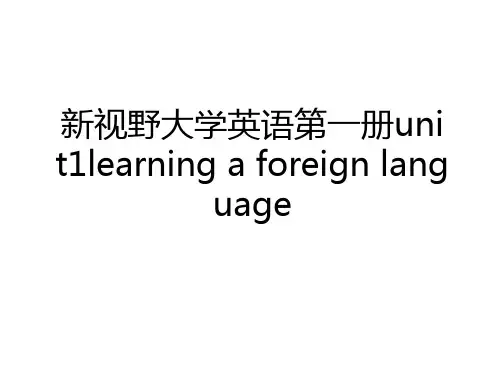
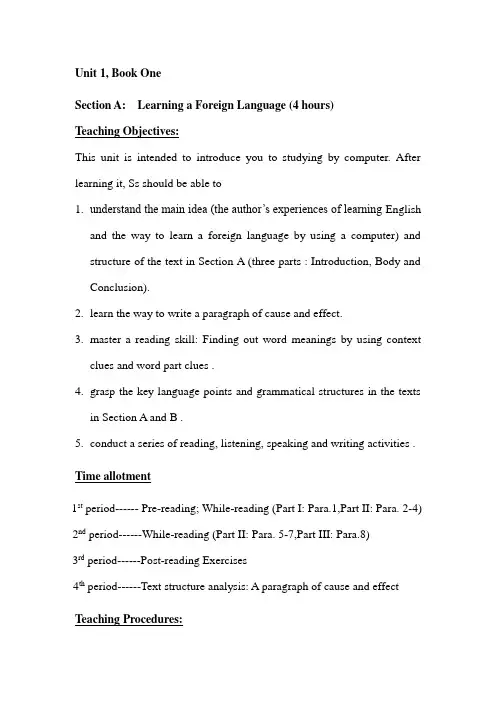
Unit 1, Book OneSection A: Learning a Foreign Language (4 hours)Teaching Objectives:This unit is intended to introduce you to studying by computer. After learning it, Ss should be able to1.understand the main idea (the author’s experiences of learning Englishand the way to learn a foreign language by using a computer) and structure of the text in Section A (three parts : Introduction, Body and Conclusion).2.learn the way to write a paragraph of cause and effect.3.master a reading skill: Finding out word meanings by using contextclues and word part clues .4.grasp the key language points and grammatical structures in the textsin Section A and B .5.conduct a series of reading, listening, speaking and writing activities . Time allotment1st period------ Pre-reading; While-reading (Part I: Para.1,Part II: Para. 2-4) 2nd period------While-reading (Part II: Para. 5-7,Part III: Para.8)3rd period------Post-reading Exercises4th period------Text structure analysis: A paragraph of cause and effect Teaching Procedures:Pre-reading ActivitiesQuestions (stimulating, involving, extending, thought-provoking, inductive questions, opinion-gap activity (20 minutes)1.T asks the following questions to learn about the students’ experiencesof learning English. Questions: 1) How long have you learned English?2) What do you think of learning English?2.T asks Ss to listen to a short passage (provided with the textbook)twice and answer the questions with their own experiences1) What problems do you have in trying to learn English in your middle school?2) What other things do you think we can gaine through English language learning ?3) Why do you think the computer can help you in learning English?Thus leading into the text by saying: Although English language learning is not easy and sometimes frustrating, we can get many things from it. Besides studying English in regular classrooms, we can learn it online. The text we are going to learn is to tell us how one student learned English by using a computer.While-reading tasks1.T asks Ss to read the first paragraph and try to find the topic sentence(Learning a foreign language was one of the most difficult yet mostrewarding experiences of my life.) (5mins)2.Ss skim the paragraphs from 2 to 4 and find out the answers to thefollowing questions by working in pairs.(20 minutes)3.Questions:1)What made the author’s English learning in junior middle schoolvery successful?(The kind and patient teacher and her positive method of praising all students often.)2)How was the author’s experience with English learning in seniormiddleschool different from his experience in junior middle school? (In junior middle school, his English teacher was kind and patient. He liked to answer questions in class and he made much progress in English. But, in his senior middle school, his teacher punished those who gave wrong answers. He didn’t want to answer questions any more in class. As a result, he didn’t make much progress in English.)3)In what way is the author’s experience with English in jun iormiddle school similar tohis experience in college? In what way are they different from each other? (In college and junior middle school, his English teachers were both patient and kind, but he didn’t have as many chances toanswer questions in college as he did in junior middle school.)nguage points and difficult sentences in the first four paragraphs(10minutes)1)Although at times, learning a language was frustrating, it was wellworth the effort. (Para.1)Meaning: Although sometimes learning a language is disappointing, it was rewording enough to spend timeand effort on it.Be well worth sth./doing sth.: be rewording enough for the time and effortThis film is well worth seeing.He has decided to have a look at the house for it is well worthbuying.2)Because of the positive method, I eagerly answered all thequestions I could, never worrying about making mistakes. (Para.2)Meaning: Because of the effective and helpful method, I was very willing to answer all the questions I could, and I never worried about making mistakes.Note: The present participle phrase “never worrying about making mistakes” functions as an adverbial of reason.positive: adj. A. effective; helpful B. definite, allowing no room for doubtC. sure, having no doubt about sth.Would you please give me any positive advice?We have to wait because we still don’t have a positive answer as to what to do next.Are you positive that he is the person you are looking for?3)Not only did I lose my joy in answering questions, but also Itotally lost my desire to anything at all in English. (Para.3)Meaning: I not only didn’t feel happy answering questions, but also I didn’t want to say anything in English.Note: With “not only” or “only” placed at the beginning of a sentence, the sentence order should be inverted.Only in this way can we finish the work in time.Not only did we enjoy the film, but also we had a good time.4)unlike: prep. Different; not like, not the same (Para.4)Her recent report is quite unlike her earlier work.Unlike me, Tom often plays football in his spare time.5)far from: not… at all; rather than (Para.4)Far from (being) angry, he’s very happy.Her son is far from (being) handsome; he is somewhat ugly.6)a couple of: two or three (Para.4)a pair of: twoa pair of shoes, a pair of gloves, a couple of children, acouple of questions7)I began to feel intimidated. (Para. 4)Meaning: I began to feel frightened and lack confidence.intimidate: vt. Make one frightened by threatsJohn intimidated his brother by saying that he would kill him.As a boy, I used to intimidate my sister into crying by telling her that a wolf was coming.Ss work in pairs to skim the paragraphs from 5 to 7 and fill in the following blanks.(10 min)8)The necessary equipment for learning English online is(a computer, phone line and modem)2) Online learning is not easier than regular classroom study becauseit requires. (much time, commitment and discipline)3) The method used by the author for online English learning is .(hard work)5.T sums up the main idea of Part II (Para.2-7) (the author’s experiencesof learning English and the way to learn English online) and asks Ss to read Para.8 and then answer the following questions.(10 minutes)Questions: 1) Why wouldn’t the author trade his experience in learning a foreign language for anything else? (Because learning aforeign language taught him the value of hard work and gave him insights into another culture.)2) According to the last paragraph, what interests theauthor most about English?(He could communicate with many more people thanbefore.)6.T explains the language points in the last four paragraphs and asks Ssto make sentences with them. (20 minutes)8) access: n. way of entering; right of using, reaching, or entering (Para.5)The only access to the building was guarded by the soldiers.With the mayor’s help, we at last allowed access to those people who suffered from the traffic accident.9) as well as: in addition to (Para.7)He gave me money as well as advice.It is not easy to do scientific research; it requires time, energy and money as well as discipline and commitment.10) feel like sth./doing sth.: want to do sth. (Para.7)After traveling a long distance, I felt like a rest.At the sight of the miserable scene, the lady felt like crying.11) give up: stop having or doing (Para.7)In order to lead a happy life, you’d better give up smoking.12) I had finally reaped the benefits of all that hard work. (Para.7)Meaning: I gained the good things that happened as a result of all that hard work at last.reap the benefits of: get sth. as a rewardHe felt that he reaped the benefits of conversations with foreigners.Note: We may say: reap a profit; reap a reward; reap wheat.13) Learning a foreign language has been a most trying experience forme, but one that I wouldn’t trade for anything. (Para.8)Meaning: Learning a foreign language has been an experience full of difficulties, but I wouldn’t exchange it for anythingelse.trade ( in) …for…: exchange…for…In order to buy a birthday present for his wife, he traded his watch for a comb.trade on: make use ofHe traded on his father’s name to r un for mayor.14) participate in: take part in (Para.8)I want to have the opportunity to participate in the party.15) now that: conj. because (something has happened) (Para.8)Now that you’re grown up, you must take good care of yourself. 16) reach out to: communicate with; contact (Para.8)reach out for: try to getreach for: hold out one’s hand to get sth.With the introduction of Internet, we can reach out to our friendsby e-mail.You must reach out for any opportunity that comes your way.The boy reached for the apple but failed.Post-reading tasks1.T checks if Ss have done vocabulary exercises (Exercise III and IV),structure exercises (Exercise V and VI) and story summary, and discuss some common errors that crop up. (35minuts)2.Ss are asked to have compound dictation (Para.8) and translate thisparagraph into Chinese. (15 minutes)Learning a foreign language has been a most experience for me, but one that I wouldn’t for anything. Not only did learning another language teach me , but it also gave me into another culture, and my mind new ways of seeing things. The most result of having learned a foreign language was that I could_________ many more people than before. Talking with people is one of my , so being able to speak a new language lets me meet new people,____________ conversations, and form new, friendships. I speak a foreign language, staring into space when English is , I can participate and . Iam able to _______ others and the gap between my language and culture and theirs.Text structure analysis1.T explains the way to write a paragraph of cause and effect and asksSs to do Exercise X in pairs. (15 minutes)2.T writes a t opic sentence “The computer is good for our life.” on theblackboard; Ss are divided into small groups (four Ss in a group) and discuss the cause and the effect, and then a group leader writes a paragraph showing a cause-and-effect relationship. T walks around the classroom and participates in the discussion. (20 minutes)3.Several Ss are asked to read their paragraphs to the class and decidewhich is the best one. (15 minutes)A paragraph for referenceThe computer is good for our life. Because of its ability to store vast amounts of information and the incredible speed at which it can work, it can speed up calculation, save us from arduous calculation, keep company accounts, analyze statistics, finish designation of projects and monitor production in factories. With the development of science and technology, people use the computer to send e-mail, or even to learn a foreign language. There is now hardly aspect of everyday life that doesn’t bring us into contract with computers.Section B: Keys to Successful Online learning (1 hours)I. Reading skill: Finding out word meaningsII. Checking on students’ home reading; ReviewReading skill: Finding out word meanings1. T introduces ways to figure out word meanings by using context cluesand guides Ss through Exercise XII. (25 minutes)Context Clue 1: Definition1)All other birthdays are called sing il (born day). The sixty-firstbirthday is called huan gup (beginning of new life).2)The harbor is protected by a jetty— a wall built out into thewater.Context Clue 2: Restatement1)He had a wan look. He was so pale and weak that we thought hewas ill.2)I am a resolute man. Once I set up a goal, I won’t give it up.Context Clue 3: General knowledge1)The door was so low that I hit my head on the lintel.2)Mark got on the motorbike, so I sat behind him on the pillion.Context Clue 4: Related information1)“She went to school for 12 years and she can’t write a sentence?”Timken said. “They made an illiterate out of my daughter!”2)Timken was now angry… Once again he flew into a rage.Context Clue 5: ExampleSelect any of these periodicals:Time, Newsweek, Reader’s Digest or The New Yorker.Context Clue 6: ComparisonThe snow was falling. Big flakes drifted with the wind like feathers.Context Clue 7: ContrastMost of us agreed; however, Bill dissented.2. T introduces ways to figure out word meanings by using words part clues and gives some common prefixes and suffixes. (15 minutes)1) Dividing Compound Wordsbackground back+ground newspaper news+paper runaway run+away skyscraper sky+scraper2) Recognizing PrefixesA prefix is a word or syllable put at the beginning of a wordto change its meaning or add to its meaning.indirect in- +direct remarry re- +marry3) Recognizing SuffixesA suffix is a syllable or syllables added to the end of a word.Suffixes can also offer clues to meanings of new words as they usually just change the parts of speech of the base words.peaceful peace+ -ful amazement amaze+ -ment Note: some common prefixes and suffixesPrefixesSuffix3.Ss work in pairs to complete Exercise XVI and check the answers.(10 minutes)Checking on students’ home reading (the text in Section B) and review1. Ss are asked to answer the question “What are the ideal qualities of successful online students?” (10 minutes)1) Be open-minded about sharing life, work, and learningexperiences as part of online learning.1)Be able to communicate through writing.2)Be willing to “speak up” if problems arise.3)Take the program seriously4)Accept critical thinking and decision making as part of onlinelearning.5)Be able to think ideas through before replying.6)Keep up with the progress of the course.3.T writes some words and expressions in Unit One on the blackboardand helps Ss review them. (15 minutes)play a role in be/become aware of/that- in addition reflect on allow forbe vital to arise embarrass reap the benefits of commitnot only…but also now that come across keep up with insightbe well worth sth./doing sth. trade for feel like access participate infrustrate unlike opportunity be likely It is/wascritical that-4.Ss are divided into two groups to have a sentence-making contest in20 minutes. The group who make more sentences will be the winner.(T-S interaction, 20 minutes)5.T assigns the homework . (5 minutes)1)Do Exercise XI in the exercise books.2)Preview the text in Section A, Unit Two and prepare a story aboutthe generation gap between children and parents.Authentic tasks after class--look up / search for information about online learning; SAT: The Scholastic Aptitude Test; GCE: General Certificate of Education-- find and read Section C, copy a thought-provoking/inspring quotation from it, bring it to the next class and share it with the class.Unit 2, Book OneSection A A Busy Weekday MorningTeaching ObjectivesThis unit explores the generation gap between young people and theirparents. After finishing studying Section A, Ss shouldbe able to·grasp the main idea (Young people and their parents might think quite differently on the same thing and seem to ignore what is important in each other’s worlds. This put them in separate worlds and creates the generation gap.)·understand the causes of the generation gap (lack of communication and understanding leads to the two different generations going separate directions) and try to bridge the gap.·be well-acquainted with the writing structure: Narration in Time Sequence·describe a series of actions in time sequence·have a good command of the important words, expressions and grammatical structure in the textTeaching Allotment·1st period: Pre-reading Activities & While-reading Activities·2nd period: While-reading Activities·3rd period: After-reading Activities·4th period: Text Structure Analysis and ReviewTeaching Procedure1.Pre-reading Activities1.1 Ss give examples for the following words and phrases (assigned in thelast period):definitely, offensive, disgust, turn up (down), turn on (off), as well asSs listen to a recording and answer the following questions after the second listening. Ss are encouraged with whatever answers they have.These are open-ended questions with no right or wrong answers.Q1: What are some of the things you think the daughter and her parents might have different ideas about?Q2: How can the older and the younger generation have real communication with and understand each other?Compound Dictation: Ss listen to the recording again and fill in the blanks with words from the tape.You are (about to) read an early morning (exchange) between a daughter and her parents. You will find how they think about the same things very (differently). You will also hear how they miss (connecting with) or understand each other. It is as if they are (blind to) what is important in each other’s worlds. This put them in separate worlds and (creates the gap between) the older and the younger generationWhile-reading Activities2.1 Para.1Important messages1) Ss find the sentence that is a strong reminder of time, the beginningof a series of actions in time sequence(The radio clicked on)2) Ss find the words that suggest a sense of suddenness(click, blast, shot)Q: Why does the author suggest a sense of suddenness?(It sets the tone of the story: The rush, suddenness, impetuousness and excitement are characteristic of young people and might come into a clash with the reserved parents.)Important words and expressionsT gives one or two examples followed by Ss’ practice with more examples1) The radio clicked on. (Para. 1)click: v. & n. (make) a short, sharp sound (like that of a key turning in a lock)The soldier clicked his heels and saluted.He clicked the light switch on.The door closed with a click.2) Rock music blasted forth. (Para. 1)blast: v. make a loud, blaring noiseThe drivers are blasting on their horns.The judge blasted his critics.3) Sandy sang along with the words as she…(Para. 1)along with: in company withShe submitted a reference and degree transcripts along with the application.2.2 Para. 2-4Main ideaSs summarize the main idea: the difference between Sandy and her father when they talked about music (Sandy likes the music which is her favorite because it has a powerful massage; her father thinks it is horrible stuff instead of really music; it is weird with offensive language, hurting ears and brain)Important words and expressionsT gives one or two examples followed by Ss’ practice with more examples1) Steve Fench burst into her room. (Para. 2)burst into: come forth suddenly and with force or impact; give a sudden express to a feelingThe police burst into the roomShe burst into tears.2)…though it does have rhythm (Para. 2): …though it really hasrhythm.Do shut up, Tom, and get on with your homework.Q: What is the word “does” used for here? (for emphasis)3) Sandy reached for the radio to turn it up louder. (Para. 3)reach for: stretch out one’s arm, esp. in order to get or touch something.He reached for the phone and knocked over a glass.The cowboy reached for his gun and said: “Reach for the skies (=put your hands up).”2.3 Para. 5-6Important messagesAsk Ss what important messages can be drawn from this part. (Sandy was bored with her parents’ bugging and seemed to enjoy privacy only in the bathroom where no one disturbed her.)Important words and expressionsT gives one or two examples followed by Ss’ practice with more examples1) At first, the water felt cold. (Para. 5)Please note that “feel” here does not mean “experience” as in the example of “He felt cold in the rain”. It means “give off a certain se nsation”.Silk feels soft.The shower feels great.2) No one disturbs me in here. (Para. 6)Sandy enjoyed the peace in the bath where she didn’t have to listen to her parents’ bugging.disturb: interrupt the quiet, rest, or peace ofHe’ll be angry if yo u disturb him while he is in conference.3) Then she put on her makeup. (Para 6): She made up her face.Important structureT draws Ss’ attention to the time sequence.Ss point out the verbs describing actions and time markers linking the actions.(Sandy walked into the bathroom→turned on the showershe woke up with the help of the cold water she thought…) (Para. 5)her shower, Sandy brushed her hair, put on her old, green T-shirt. Then she put on her makeup, grabbed her books and went to the kitchen) (Para. 6)2.4 Para. 7-25Important messagesWhat does the dialogue between Sandy and her mother suggest about their communication, differences, even conflict?On one hand, Mother was unhappy with what Sandy did in the morning: she ate standing by; she didn’t brush her teeth beforebreakfast; she wore disgusting old T-shirt and she wore eyeliners. On the other hand, Sandy was bored with Mother’s bugging and muddled through their conversation. Both sides were a little annoyed.Important words and expressionsT gives one or two examples followed by Ss’ practice with more examples1) As usual, she didn’t know what to have for breakfast, … (Para.7)as usual: in the habitual way; as has happened beforeAs usual, he got up very early that morning.As usual, Sandy’s music made her father’s stomach feel uneasy.2) It’s disgusting. (Para. 18)disgusting: bringing or causing a strong feeling of dislike of distasteThere is a disgusting smell of rotting cabbage in the school canteen.His behavior is disgusting to all decent folk.3) Sandy pretended not to notice that her mother was a little annoyed. (Para. 23)annoy: make rather angry; cause inconvenienceShe felt annoyed when her roommate refused to help.He was annoyed to learn that the flight would be delayed.It annoyed me that my neighbor played their TV late at night.Important structure1) She ate a piece of toast while standing by the sink (Para. 7)While + -ing: during the time that; at the same time asHe read the paper while waiting his turn.2) I’ll brush my teeth when I’m done (Para.17).Be + done: at the point of completionWhen you are done, turn out the lights.2.5 Para. 26Main idea(Feeling unhappy about arguing too much with her mother, Sandy missed her brother who could talk with her and share her problems.) This paragraph summarizes the whole reading: Both sides of parents and children seem to ignore what is important in each other’s worlds.This put them in separate worlds and creates the generation gap.Important words and expressionsT gives one or two examples followed by Ss’ practice with more examples1) … but she hadn’t heard from him for a while. (Para. 26)hear from: receive communicationThe letter was the last the old man heard from his son.We haven’t heard from her for ages.After-reading ActivitiesComprehension of the TextV oluntarily or by turns, Ss answer some of the questions in Exercise II in the textbookFurther understanding of the theme: generation gapSs discuss in pairs. Then T invites several Ss to give their opinions on the following questions:1)How is the music you and your parents like differently?2)What do you think about your wear?3)What do you do when your mother bugs you?4)What do you usually argue with your parents about?5)What signs, if any, of a generation gap exist between you and yourparents?T guides Ss through the following exercises in the textbook.Ss speak out their answers first; T and Ss discuss some common errors1)Summary (Ex. IX)2)V ocabulary (Ex. III, IV)3)Structure (Ex. VI)4)Translation (VII)Structured Writing1) T calls Ss’ attention to the time sequence in writing: To describesomething according to the order of time is especially commonwith narrative writing.2) Ss go through the text again and try to find out how thepresentation of details clearly follows the progress of time.(The radio clicked on, a reminder of time. it was 6:15 A.M., time for getting up. After a couple of events, and after her shower, the conversation went on and something more happened. Then suddenly she looked at the clock again; it was late, still a strong indication of the time passing. And at last, she ran to catch the school bus, the time marker is expressed through the action of leaving.)3) Ss write a short paragraph within ten minutes. Follow the waythe writer presents a series of actions according to a sequenced order and use time markers whenever possible. (Exercise XI)4) T invites a few Ss to read their paragraphs to the classmates.Homework4.1 Improve the written paragraph just finished; prepare a five-minutespoken report on the understanding of Generation Gap4.2 Preview the whole part of B; look up in dictionaries for the usage ofthe following new words and get ready to show some examples in next period.upset, rid, radical, in peace and quiet, get rid of, talk overSection B Parent TalkTeaching ObjectivesAfter finishing studying Section B, Ss should be able to·Understand the main idea (The parents see through the problems withtheir daughter and make efforts to understand howyoung people feel and why they act in a certain wayso as to find answers to the problems. )·Be familiar with one of the important reading skills: DistinguishingBetween Facts and Opinions·have a good command of the important words, expressions andgrammatical structures in the textTeaching Procedure (two periods)1. Pre-reading Activities1.1 Two or three Ss give oral presentation of the report on Generation Gap1.2 Ss give examples for the following words and phrases (assigned in the last period):upset, rid, radical, in peace and quiet, get rid of, go too far, talk over2.While-reading Activities2.1 Ss skim for the answers to the following questions to see how muchthey understand the text by preview:1)Why can’t Jane and Steve concentrate on reading?(They are worried about their daughter.)2)Why does Jane say they should feel lucky?(The biggest problem with their daughter is only makeup, which, compared with that of other teenagers, is not a big problem.)3)Which sentences in the conversation show that Jane is trying tounderstand her daughter? (L8: … different music appeals to different generations.L23: I suppose they’re expressing their identity…L30: Every generation seems to need to identify itself.L36: Oh, I don’t think her music is so terrible. I like it.L38: You know I like loud, weird music.)4)What do we know about Steve?(When he was young, he was also a rebel, wearing long hair and almost got expelled from school)5)What was the answer Jane has found to the problem with herdaughter?(The last paragraph)2.2 Question-raising by SsT continues to ask Ss to paraphrase these difficult sentences if not covered by Ss’ questions.1) My stomach feels upset—full of knots. (Para. 3)(My stomach is making me feel ill. It feels like it is full of tight lumps)2) Every generation seems to need to identify itself.(Individuals in every generation seem to have the need to express themselves and show their identity, including their individuality, character, ideas, attitudes, and problems, et.)3) She knew she had to have patience and keep the lines ofcommunication with her daughter open.。
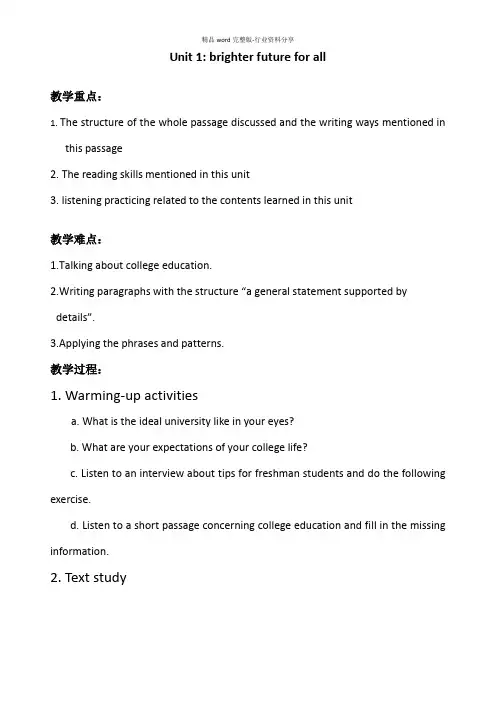
Unit 1: brighter future for all教学重点:1. The structure of the whole passage discussed and the writing ways mentioned inthis passage2. The reading skills mentioned in this unit3. listening practicing related to the contents learned in this unit教学难点:1.Talking about college education.2.Writing paragraphs with the structure “a general statement supported by details”.3.Applying the phrases and patterns.教学过程:1. Warming-up activitiesa. What is the ideal university like in your eyes?b. What are your expectations of your college life?c. Listen to an interview about tips for freshman students and do the following exercise.d. Listen to a short passage concerning college education and fill in the missing information.2. Text studya. Main idea of the partsIn his welcome speech, the president urges students to take advantage of the unique opportunity to face new exciting experience and to challenge themselves so that they will reap the benefits of their college years. The president also expresses the university’s expectations of its students and of the responsibilities they carry.Part I (Para. 1-3): The president congratulates students on their achievement and reminds students of the fact that their current success was due to their own and their par ents’ efforts, and that their future is built on a solid foundation of the past.Part II (Para. 4-7): The president offers students comprehensive advice on how to make the most of their four college years and makes them realize the university’s expectations and their own responsibilities.Part III (Para. 8): The students are called upon to cherish the opportunity and to bear in mind their responsibilities as citizens of their communities, their country and the world.b. Structure of the text✧Opening part of the welcome speech✧Advice✧Concluding partc. Summary of the text✧Main idea✧Language focusPledge to do sth. : China and the United states pledge to boost cooperation and exchange to ensure a better future for China-US ties.Make the most of sth.: This article introduces 7 tips for making the most of your iPhone5S.Reap the benefits: Keep on reading extensively, and you will reap the benefits sooner or later.Feel overwhelmed by sth.: Nowadays, many young people feel overwhelmed by the fierce competition in the job market.Stand chance of:Animals stand little chance of survival under such extreme weather.Take great pleasure in:He always takes great pleasure in lending a helping hand to people around him.Open the door to sth.:These useful suggestions open the door to better communication with your parents.3. Language applicationa. writing device✧Sentence writingParallelism:By placing two or more ideas of equal value in the same grammatical form enables us to express these ideas clearly and emphatically.Example: You may have cried tears of joy to be finally finished with high school;your parents may have cried tears of joy to be finally finished with doing your laundry!✧Paragraph writing: topic →details→conclusionExample:For you, these next four years will be a time unlike any other. (Topic sentence) Here you are surrounded by great resources: interesting students from all over the country, a learned and caring faculty, a comprehensive library, great sports facilities, and student organizations covering every possible interest from the arts to science, to community service and so on. (Detail 1: What is available to you on campus) You will have the freedom to explore and learn about new subjects. You will learn to get by on very little sleep, meet fascinating people, and pursue new passions. (Detail 2: What you can do) I want to encourage you to make the most of this unique experience, and to use your energy and enthusiasm to reap the benefits of this opportunity. (Concluding sentence) Activities performed in class:⏹Do you think a university education can change a person’s life? In what wayand why?⏹How do you think of those successful people such as Bill Gates who droppedout of university?⏹What are you going to do at university in order to sample widely andchallenge yourself?Viewing, listening and speakingUnit 1 Traces of the past教学重点:1.talk about past events and their impacts on the present2.discuss in groups the activities you do at weekends and add as many activitiesas possible教学难点:1.conduct an interview2.describe an event教学过程:Opening-up1.talk about the activities shown in the pictures2.Work in pairs and compare your answers.Listening to the word1.Ask Ss to watch a podcast to get its general idea and discuss their answers ingroups.2.Ask Ss to watch a podcast and fill in the blanks.3.Ask Ss to discuss the following questions based on what they have heard.Questions:1.What did you do last weekend? Did you enjoy it? Why or why not?2.What can you learn from Mother Teresa’s words “Ican do no great things,only small things with great love”3.What childhood experience did you have that had a great impact on yourpresent life?4.Did your parents make you take up a hobby such as playing the piano,practicing calligraphy or playing table tennis when you were a child? Did you like it at that time? How do you think about it now?Role-playWork in pairs and role-play one of the following situations by using skills for asking for and giving recommendationsSituation 1: seeing a movieSituation 2: going out for dinnerAssignment:Work in groups of four. Share briefly with your group members a recent event you went to, e.g. a festival, a concert, a sports event, an exhibition, a play, a party, or a film.___5月4日星期三上午10:10各位评委老师,上午好!我是应用外语系英语教师魏芳秀,我今天说课的题目是新视野大学英语2 第3单元Marriage Across Nations (板书:课题、作者),下面我将从说教材(教材分析、课标、三维目标)、说教法、说学法、说教学过程(含CAI / TBLB的应用)、说板书设计五个方面来对本课进行说明。
Unit 1, Book OneSection A: Toward a brighter future for all1. Teaching Objectives:To know the meaning and usage of some important words, phrases and patternsTo study Passage A and understand the main idea of the textTo understand the structure of the text and the devices for developing itTo talk about college education2.Time Allotment:Section A (3 periods):1st---2nd period: Pre-reading activities ( theme-related questions for warming up;)While-reading activities (cultural notes; useful words and expressions;difficult sentences)3rd period: While-reading activities (text structure; main ideas)Post-reading activities (comprehension questions; exercises) Section B(1period):4th periods: Practice of the reading skill (reading for the key idea in a sentence);T checks on Ss’ home reading by asking questions based on the passage.T explains some difficult sentences3.Teaching Procedures:Pre-reading ActivitiesStep 1. GreetingsGreet the whole class warmly.Step 2. Lead-in and preparation for readingLet them talk to each other about the following questions:1. What is the ideal university like in your eyes?2. What are your expectations of your college life?3. What advice did your parents give you before you left for college?Step 3. Fast readingAsk the Students to read the passage as quickly as they can and then answer the questions on the screen. Let them get the main idea of each paragraph and make clear about the text structure.Text structure: ( structured writing ) The passage can be divided into 3 parts.Part1 (para.1-3) Opening part of the welcome speechPart 2 (para.4-7) Making the best of what you have.Challenging yourself.Facing new experiences.Opportunities and responsibilities.Part 3 (Para.8) Concluding remarks of the welcome speech.Purpose: Improve the students’ reading and writing ability and understand the general idea of each paragraph.Method: Read the text individually and talk in groups; Use task-based language teaching method, reading approach, communicative approach and total physical response method.Step 4. Preparation for details of the text on the screenStudents are required to look at the Words and Phrases on the screen and give a brief presentation in class.Words and Phrases:Purpose: Train the Students’ ability of understandi ng and using foreign language.Method:Talk in groups, Use task-based language teaching method, communicative approach and total physical response method.1. (Para.1)pledge to do sth. 作保证,承诺China and the United states pledge to boost cooperation and exchange to ensure a better future for China-US ties.中美政府承诺将加强合作与交流以确保两国关系的未来更加美好。
课程名称:New Horizon College English (Book I)教者:课题:Unit 1 Learning a Foreign LanguagePeriod (1-2)Teaching Objectives:1) Students learn some key words and expressions of CET-4.2) Help students grasp the new words and expressions of section A.Teaching Focus and difficult points:1) The main idea of section A.2) The understanding of section A including some difficult expressions. Teaching Aids:Teaching notes prepared by the teacherBlackboard,Tape recorderTeaching ProcedureStep 1 Ts’ opening remarksStep 2 Explanations of new words1.rewardv. reward sb with/for stheg. Her parents rewarded her for her passing the exam.The citizens rewarded the winners with gifts of fruit and flowers.n. He give the boy a reward of one dollar for bringing back the lost dog.rewards (pl)好处Teaching children has its own rewards.rewarding a .有益的,报答的,值得做的,有用的rewardless a. 无报酬的,徒劳的Compare: reward /awardreward 指干了好事或有益的事受到奖赏得到报酬award 指官方给予或授予award sb sth award sth to sb2.frustratev. ~ing ~edIt is (was) ~ing to do sth/ It is ~ing thatIt is ~ing that no one agreed with mebe ~ed in sth be ~ed to do sthI am ~ed in the result of the exam.~tion n. 挫折,失败Compare: beat , defeat, discourage3.positivea. Do not just watch me; give me some ~advice.(effective, helpful)We still do not have a ~ answer as to how he died.(definite)Be ~ of /that : Are you ~ that he is the man you saw yesterday?Are you ~ of her honesty?近: definite 反: negativemunicatev. ~ sth to 向…传达~ with 和…沟通(相连)We should learn to ~ with others.The officer ~d his order to the soldiers by radio.She tried to ~ her thoughts to her children.~tion n. ~tive a. 愿意说的~nicable a.可传达的5.mediumn. Air is a ~ of sound.Newspaper is a prime ~ of communication.The boy is of ~ height for his ageCompare: ~ / middle ~ 指按照具体或抽象标准衡量中等或适中的Middle 指距离.要求.标准.方位等的中间A man was lying in the middle of the road.I want to buy a ~-sized coat.6. accessn. have ( get, gain ) ~ to sth ( sb )The only ~ to that building was guarded by the soldiers.He was not allowed ~ to his brother who was in prison.It is difficult to gain ~ to him.Students must have ~ to good books.accessible ( to ) a. 容易得到的,可以使用的accessibility ( to ) 易接近,易取得Compare: assess 评定(估,价),核定,判断, asset 优点,天赋,(复数)资产excess 超过,超量,过剩mitment]n. make/take/undertake a ~ to do sthHe felt he did not have to make such a ~ to Mary.I do not want to get married because I do not want any ~s.Commit v. commit a crime /mistake commit suicidecommit oneself to 承担义务,承诺admit ,emit, limit, omit, permit, submit, transmit8. minimumn. The ~ passing mark is 40 out of 100.The temperature reached a ~ at midnight.~ ( pl )- minimums or minima (反) maximummini- 微型的,小的miniskirt minibusminimal a. 最小的,最低限度的minimize v. 使减少到最低限度9.embarrassvt. It ~ed her that her husband was drunk at the dinner.~ing a. ~ed a. ~ingly adv. ~ment n. 局促不安,难堪be/feel ~ed sth is ~ing ~ sb with sth/by doing sthShe was ~ed when they asked her age.I do not like making speeches in public; It is so ~ing.Compare:~ing/~ed/awkward~ing (某事,某种情理)使人尴尬~ed (某人)尴尬的awkward a.尴尬的,棘手的,可修饰人,也可修饰物.He was in an awkward situation.10. benefitn. He told me that he got no personal ~ from the businessRain will ~ the crops.v. (sth.) ~ sb ; ~ sb ; ~ (a lot/greatly) from/by (sth./doing sth.)for the ~ of =for the interest / good of ; be of ~ to sb. /sth. 对….有裨益I travel for the ~ of my health.The book was not of much ~ to me.beneficial a.Compare: ~ ; good ; profit11.be well worth sth./doing sth.A bird in hand is worth two in bush.The picture is worth ten thousand dollars.The film is well worth seeing.12.not only….but alsoShe is not only a good wife , but she is also a good mother.Not only did we enjoy the film, but we also had a wonderful time.另外: Only in this way can you hope to finish the work at the end of this month.当它连接两个并列成分做主语是,谓语的单复数采用就近原则,由but also 后的名词决定,英语中还有either….or… ; neither….nor….Not only she but also I like the dress.13. reap the benefits ofHe has reaped the benefits of a first-class education.I hope you will reap the benefits of investing in it.14.reach out ( to )We must ~ to those in need.reach out for You must reach out for any opportunity that comes your way.reach for He reached for the phone and dialed the number.15. rade…for/with:歌迷用五张光盘换到一张演唱会的入场券。
第三版新视野大学英语1-unit1教案XXX教案课程名称:新视野大学英语I学时授课班级:见附录课题:Unit 1 Fresh Start日期:见附录序号:2任课教师:见附录能力目标:1.激发学生对第一单元主题的兴趣,并积极参与。
2.让学生思考如何应对大学生活。
应用性知识目标:目标:1.听听力材料,并抓关键词,理解听力内容。
2.知道给大一新生的建议。
3.正确的发音朗读单词和短语。
教学训练项目(任务):1.听力技巧训练:抓关键词,理解听力内容。
2.新生建议听力活动。
3.词汇训练。
教学媒体准备:1.新视野大学英语I光盘。
2.新视野大学英语I unit1课件。
教学活动步骤及时间安排:1.问候和介绍(10分钟)2.说课(30分钟)3.主题讲解:大学新生的新起点(10分钟)4.听力活动:听一篇采访(20分钟)5.词汇训练(30分钟)板书设计:听力XXX:1.Keep a balance2.Go to class regularly3.Participate in Campus ActivitiesGetting XXX is a great way to make new XXXJoining clubs。
attending events。
XXX。
By doing so。
you can attain a sense of XXX.4.Find a XXXFinding a good place to study is crucial for academic success。
Whether it's the library。
a quiet coffee shop。
or a study room in your dorm。
it's important to have a designated space where you XXX studying。
you can XXX.5.Utilize Campus Study ResourcesXXX of study resources to help students succeed。
全新版《大学英语》教案 课程名称: 大学英语(一级) 专业: 建筑城规、土木、自动化、光电、电气和数理等学院 年级: 2007级 学年: 2007-2008 学期: 第一学期 任课教师:全新版《大学英语》板块任课教师
编写时间:2007年9月 1
Course Schedule Aims: 1) 帮助学生尽快适应大学英语教学模式、要求、特点和方法。从一开始就培养学生良好的语言学习习惯和独立自主的学习方法,树立良好的学风,要求学生积极参与英语课堂教学活动和实践活动,营造良好的英语学习氛围,调动学生英语学习的积极性。 2) 巩固语法知识,扩大学生词汇量,加强阅读及阅读技能训练。重视听说能力的培养以及初步的写作及做课堂笔记的能力。 3) 通过教师监督和学生分组相互检查的方式督促学生保证每天有半小时至一小时的听力训练,为听力的提高奠定基础。 4) 通过快速阅读训练提高学生的阅读速度,督促学生完成泛读文章,扩大阅读量。
Required course materials: College English (New Edition Book 1) — Integrated Curse, Listening and Speaking Course, Reading Course Note: The Reading Course Book is used as Ss’ self-access material.
Useful English Learning Resources: Magazines: English Language Learning, College English, English Salon, English Weekly, The world of English, English Digest, Overseas English Newspaper: 21st Century, China Daily Websites: http://epizza.nease.net (英语比萨园地); http://www.listeningexpress.com (听力快车); http://www.putclub.com (普特英语听力); http://www.4ewriting.com (英文写作网); http://www.wwenglish.com (旺旺英语); http://www.chinadaily.com.cn (中国日报); http://www.guardian.co.uk (英国卫报) http://www.washingtonpost.com (华盛顿邮报)
新版《大学英语》一级教学日历(2007.10-2008.1) Weeks Contents Periods Autonomous Listening Week 5 10.8-10.14 学前教育(师生彼此认识,介绍教学要求,英语学习的方法,教材的安排使用等,明确本学期的教学目标及教学重点和难点。帮助学生制定学习计划和改善学习习惯。) Unit 1 Writing for Myself
1 2 International Phonetic Alphabet
Week 6 10.15-10.21 Unit 1 Writing for Myself Speaking 2 1 International Phonetic Alphabet Week 7 10.22-10.28 Unit 2 Friendship+检查阅读 Unit 1 Speaking 2 1 Autonomous Listening 1
Week 8 Unit 2 Friendship 2 Autonomous Listening 1 2
10.29-11.4 Writing 1 Week 9 11.5-11.11 Unit 3 Understanding Science+ 检查阅读 Unit 2 Speaking
2 1 Autonomous Listening 1
Week10 11.12-11.18 Unit3 Understanding Science Writing 2 1 Autonomous Listening 1
Week 11 11.19-11.25 Unit 4 American Dream+检查阅读 Unit 3 Speaking 2 1 Autonomous Listening 1
Week 12 11.26-12.2 Unit 4 American Dream Writing 2 1 Autonomous Listening 1
Week 13 12.3-12.9 Unit 5 Romance+检查阅读 Unit 4 Speaking 2 1 Autonomous Listening 1
Week 14 12.10-12.16 Unit 5 Romance Writing 2 1 Autonomous Listening 1
Week 15 12.17-12.23 Unit 6 Animal Intelligence+检查阅读 Unit 5 Speaking 2 1 Autonomous Listening 1
Week 16 12.24-12.30 Unit 6 Animal Intelligence Writing 2 1 Autonomous Listening 1
Week 17 12.31-1.6 Oral Test 3 3
Unit 1 Writing For Myself 1. 教学目标及基本要求: Objectives: Students will be able to: 1) grasp the main idea (the essence of writing is to write what one enjoys writing) and structure of the text (narration in chronological sequence); 2) appreciate the narrative skills demonstrated in the text (selection of details, repetition and the use of synonyms.) 3) master the key language points and grammatical structures in the text; 4) conduct a series of reading, listening, speaking and writing activities related to the theme of the unit.
2. 教学内容及学时分配: Time allotment: 1st period: pre-reading; text organization 2nd period: while-reading 3rd period: post-reading activities 4th period: reading practice 5th period: speaking 6th period: writing
3. 教学重点及难点: Important language points and grammatical structures in the text
4. 教学内容的深化及拓宽: Students conduct a series of reading, listening, speaking and writing practice to deepen their
understanding of the points taught in class.
5. 教学方式及在教学中应注意的问题: A combination of traditional teaching methods with the communicative approach will be adopted. Special attention should be paid to classroom interaction. Give students time to adapt to the new teaching mode in the university that are quite different from the one they were used to in the middle school. More encouragement is needed and more guidance will be given to them in their extracurricular study.
6. 主要参考书目: 季佩英,吴晓真,2001,《全新版大学英语综合教程1-教师用书》。上海:上海外语教育出版社。 柯彦玢,张砚秋,2002,《全新版大学英语阅读教程1-教师用书》。上海:上海外语教育出版社。 4
朱万忠,2002,《大学英语阅读进阶1》。重庆:重庆大学出版社。 7. 思考题和习题: 《全新版大学英语综合教程1》第一单元Text A后的所有习题。 阅读第一单元Text B,完成后面的相关练习。 《全新版大学英语阅读教程1》第一单元及相关练习。 《大学英语阅读进阶》第一单元及相关练习 Writing Assignment
1st Period: 1. Pre-reading Tasks: 1) Students listen to the recording and do the pre-reading task on page 2 of their book. (15 minutes) 2) Warm-up Questions (10 minutes) Students are required to scan the text and answer the following questions: a) Suppose you were the writer, would you enjoy writing ―The Art of Eating Spaghetti / noodles‖? Why / Why not? b) Why does the author enjoy writing this? In which paragraph lies the answer? c) Look at the title and find out in which paragraph a similar phrase appears. Read this paragraph and explain in your own words what the author means by saying ―write for myself.‖